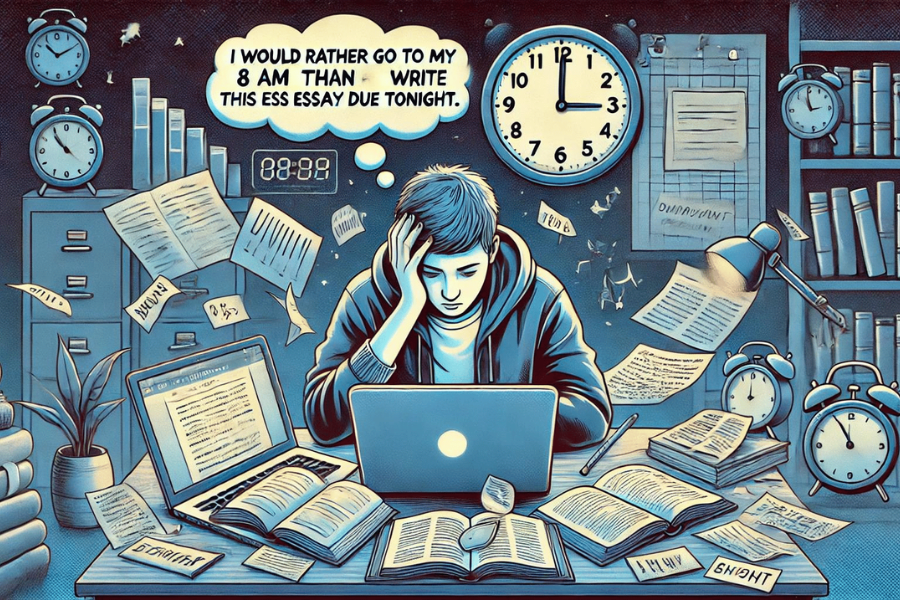I’d Rather Go to My 8 AM Class Than Write This Stupid Essay Tonight: Understanding and Overcoming Avoidance
We’ve all experienced the sinking feeling as a deadline approaches, only to find ourselves caught in the endless cycle of procrastination. The clock is ticking, and that essay or project due tonight looms ever larger, yet instead of diving into the work, we indulge in scrolling through social media or binge-watching our favorite shows. This pattern of behavior—avoidance—is both familiar and frustrating. It’s a temporary escape from the responsibilities that inevitably await us.
The battle with avoidance is a real struggle. Whether it’s an overdue paper or a pile of chores that seem to grow in magnitude, avoidance can feel like a comforting blanket. But what if this seemingly harmless habit is holding us back in more ways than we realize? What if it impacts not only our productivity but also our mental health? Let’s explore the art of avoidance and discover how we can break free from its grip—because, let’s face it, you’d rather go to that 8 AM class than write that essay due tonight!
Understanding Avoidance and Why We Do It
Avoidance is a common behavior many of us engage in. It’s essentially our mind’s way of escaping the discomfort or anxiety associated with tasks. When faced with a daunting challenge, it often feels easier to engage in distractions like social media rather than confront the looming deadline.
Many of us avoid tasks because we fear failure or judgment. The thought of not meeting expectations can be paralyzing, leading us to seek out distractions rather than facing what lies ahead. Procrastination then becomes almost second nature. We convince ourselves that we work better under pressure, but deep down, we know this isn’t true.
The cycle of avoidance and procrastination continues as guilt sets in; the more we delay our responsibilities, the heavier they weigh on our minds. Understanding avoidance isn’t just about recognizing these patterns—it’s about acknowledging why they exist and how they affect our daily lives.
Negative Outcomes of Avoidance on Our Mental Health and Productivity
Avoidance can be a silent thief, robbing us of both mental clarity and productivity. When we procrastinate, stress begins to build up. The tension of unfinished work hangs over us like a dark cloud.
Procrastination leads to feelings of guilt and frustration. Each delay compounds the stress, making it increasingly difficult to start. This creates a vicious cycle that affects self-esteem and motivation.
Furthermore, avoidance hinders personal growth. By shirking from challenges, we miss opportunities for learning and development. Instead of building resilience, we nurture fears associated with failure.
Creativity also suffers in an environment filled with unresolved responsibilities. A cluttered mind struggles to innovate or think freely when overwhelmed by tasks that remain unaddressed.
Long-term avoidance can even lead to chronic stress or burnout, affecting both physical health and emotional well-being. It’s crucial to understand these effects before they spiral out of control.
Tips for Overcoming Avoidance
A. Identify the Root Cause
Understanding the root cause of your avoidance can feel like peering into a tangled web. Often, we bury ourselves in distractions without examining why we avoid tasks. Are you overwhelmed by fear? Perhaps it’s perfectionism whispering doubts about your abilities. Many fall victim to self-criticism, leading to procrastination and avoidance.
External factors can also play a significant role. An unmanageable workload or tight deadlines can contribute to avoidance behavior. Recognizing these pressures helps illuminate your actions.
Take a moment for introspection. Ask yourself what truly holds you back from completing that essay or task. Journaling can be an effective way to explore these emotions without judgment.
By pinpointing the core issue behind your tendency to avoid tasks, you are already taking the first step toward tackling them head-on with determination and clarity.
B. Set Realistic Goals and Deadlines
Setting realistic goals and deadlines is crucial for overcoming avoidance. When tasks feel monumental, it’s easy to retreat into procrastination.
Start by assessing what you can realistically achieve within a given timeframe. Break large projects into smaller milestones with specific due dates. This approach not only makes daunting assignments more manageable but also provides a sense of accomplishment along the way.
Be mindful of your personal limits and commitments. Overloading yourself can lead to frustration and further avoidance.
Remember that flexibility is key—adjust your goals as needed without guilt or shame. Celebrate small victories as they come; this can motivate you to keep pushing forward.
Creating a feasible roadmap fosters confidence and commitment, transforming overwhelming tasks into achievable steps on your path to success.
C. Break Tasks into Smaller, Achievable Chunks
Tackling a daunting assignment can seem overwhelming. The idea of completing it all at once often results in avoidance. Instead, break it down into smaller pieces.
Start by identifying specific components of the task. This approach makes what seems insurmountable appear more achievable. Each small victory builds momentum and confidence.
Allocate short time blocks for these mini-tasks. You might find that dedicating just 15 or 20 minutes can lead to significant progress without feeling like you’re drowning in work.
Celebrate each completion, no matter how trivial it may seem. Recognizing these accomplishments boosts motivation and reinforces your ability to handle larger responsibilities over time.
By shifting focus from the big picture to manageable parts, you transform anxiety into action—a crucial step toward overcoming avoidance behaviors.
D. Seek Support from Friends or Professionals
Sometimes, tackling tasks alone can feel overwhelming. Reaching out to friends or professionals can significantly lighten the load.
Friends offer fresh perspectives and encouragement. Sharing your struggles with someone who understands can provide motivation. They might even join you in completing that dreaded essay.
Professional help is another avenue worth exploring. Therapists and coaches specialize in helping individuals overcome avoidance tendencies. They offer tools tailored to your specific needs, making it easier to confront what lies ahead.
Remember, asking for help isn’t a sign of weakness; it’s an essential step toward overcoming procrastination. Surrounding yourself with supportive people creates an environment conducive to productivity—one where taking action feels less daunting.
Benefits of Facing Tasks Head-On
Facing tasks head-on transforms anxiety into accomplishment. When you tackle challenges directly, you build resilience. Each completed project boosts your confidence and reinforces a proactive attitude.
Additionally, addressing tasks promptly reduces stress. Procrastination often magnifies worries, while action diminishes them. You’ll find that the dread of starting is generally worse than the task itself.
Moreover, completing tasks promptly opens up opportunities for growth. It frees up time for creativity and new ventures instead of being trapped in an endless to-do list.
Direct engagement also fosters clarity. As you dive into assignments, solutions become clearer and more attainable. This newfound awareness significantly enhances productivity.
The positive effects extend beyond individual tasks; they improve overall life satisfaction as well. Embracing challenges leads to personal growth, fostering a proactive approach to future endeavors.
Conclusion: Embracing the Art of Action Over Avoidance
Taking action transforms your mindset. Each step you take chips away at the weight of procrastination.
When faced with a daunting task, remind yourself that starting is often the hardest part. Even small progress feels rewarding. It builds momentum and confidence.
Embracing challenges results in personal growth. You learn resilience and develop problem-solving skills along the way.
Avoidance may seem comforting in the moment, but it creates stress and anxiety over time. Facing responsibilities head-on liberates you from these chains.
Celebrate your achievements, no matter how minor they seem. Every completed task reinforces positive habits and reduces future avoidance tendencies.
Building a routine around confronting tasks can create lasting change in your life approach. The art of action becomes a powerful tool against hesitation and doubt, opening doors to new opportunities.
FAQs
What is avoidance, and why do we experience it?
Avoidance is a coping mechanism where individuals steer clear of tasks or situations that induce stress, anxiety, or discomfort. It often stems from fear of failure or perfectionism, becoming a habitual response that makes confronting responsibilities difficult.
How does avoidance affect mental health?
Consistent avoidance can lead to increased anxiety and depression. Unaddressed tasks pile up, creating overwhelming stress that negatively impacts overall well-being. This accumulation can exacerbate mental health issues.
Can setting goals really help with avoidance?
Yes! Setting realistic goals allows you to break down large tasks into manageable pieces. With clear deadlines in place, you’re more likely to take action rather than procrastinate.
What are some strategies for getting started on an avoided task?
Start by identifying the root cause of your reluctance. Then, set small, manageable goals related to the task to make starting easier. Additionally, seeking help from friends can provide motivation and support.
Is facing my fears worth the effort?
Absolutely! Confronting challenges enhances productivity and builds resilience over time. Each step towards overcoming avoidance brings a sense of achievement that boosts self-confidence.
Stay informed with in-depth articles and the latest developments at InternalDash.com.






